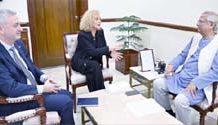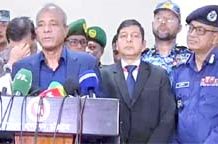C T Online Desk: Caught firmly in the grip of the coronavirus pandemic during the last two years, Bangladeshis were forced to commemorate Pahela Boishakh, the first day of the Bangla calendar, with low-key celebrations that were mostly confined to their homes.
But this time, the country is set to emerge from the shadows of the pandemic and mark the day with customary gusto as the Ministry of Cultural Affairs has announced full-scale celebrations to ring in the Bangla New Year 1429.
Chhayanaut is set to hold its flagship curtain-raising event at dawn while preparations are in full swing at Dhaka University’s Institute of Fine Arts for the fully-fledged return of the colourful Mongol Shobhajatra, a thematic parade that ushers in the new year.
The traditional procession was cancelled in 2020 and was scaled down last year. But as the COVID-19 pandemic continues to ebb away in Bangladesh, the authorities are planning to expand the Mongol Shobhajatra, declared a UNESCO cultural heritage in 2016, to the district and upazila levels.
Baishakhi fairs will also be hosted across the country. However, revellers must comply with health and safety directives to minimise the risk of COVID-19.
Local administrations are also organising a quiz competition, focusing on the new year and Bangabandhu Sheikh Mujibur Rahman along with cultural programmes and folk fairs bedecked with colourful decorations, according to the Ministry of Cultural Affairs.
Laisa Ahmad Lisa, general secretary of Chhayanaut, said the organisation will be celebrating Pahela Boishakh with an array of cultural programmes at the Ramna Batamul starting at 6 am with the motto of “Nobo Anonde Jago” (Awaken to renewed joy).
Students have been preparing for a few weeks at the Dhaka University’s Institute of Fine Arts for the Mongol Shobhajatra, even putting up some artworks on display for sale.
During a visit to the campus on Wednesday, the bdnews24.com reporter found a group of students engaged in ceramic artwork, drawing fishes, flowers and other motifs in front of the Zainul Gallery while another group was beautifying festival masks based on different themes, including animals such as lions and tigers.
This year’s procession will feature five motifs, represented by a large-scale replica of a horse alongside other handcrafted clay figurines and traditional artefacts, all of which are being crafted by artisans under the guidance of students.
Nisar Hossain, the dean of the fine arts institute, said the organisers are unwilling to put a limit on the number of participants in this year’s procession. Anyone can take part in the parade as long as they follow the health guidelines.
The procession will kick off at 9 am as usual. “It will start from the TSC intersection before weaving its way to the residence of Dhaka University’s vice-chancellor. It will later come to an end at the TSC,” he said.
The cultural affairs ministry said the authorities are emphasising public security at the procession and Ramna Batamul to ensure the participation of ordinary people in the festivities.
A number of government organisations will hold programmes to celebrate the Bengali New Year, including the Bangla Academy, Kabi Nazrul Institute, Bangladesh Shilpakala Academy, Bangladesh National Museum and many more. The Bangladesh missions in foreign countries will also host events to commemorate the day.
NO PROGRAMMES AT BAKULTALA, RABINDRA SAROBAR
However, Dhaka University’s Department of Music has decided against organising any event to celebrate the new year due to the ongoing exams at the department, according to Prof Dr Shahnaz Nasrin Ila.
At the same time, the Sammilito Sangskritik Jote has also postponed its celebratory programme at the Rabindra Sarobar.
The organisation will hold a remembrance programme for its late general secretary Hasan Arif in May, said its President Golam Kuddus. It will abstain from any festivity until then.















